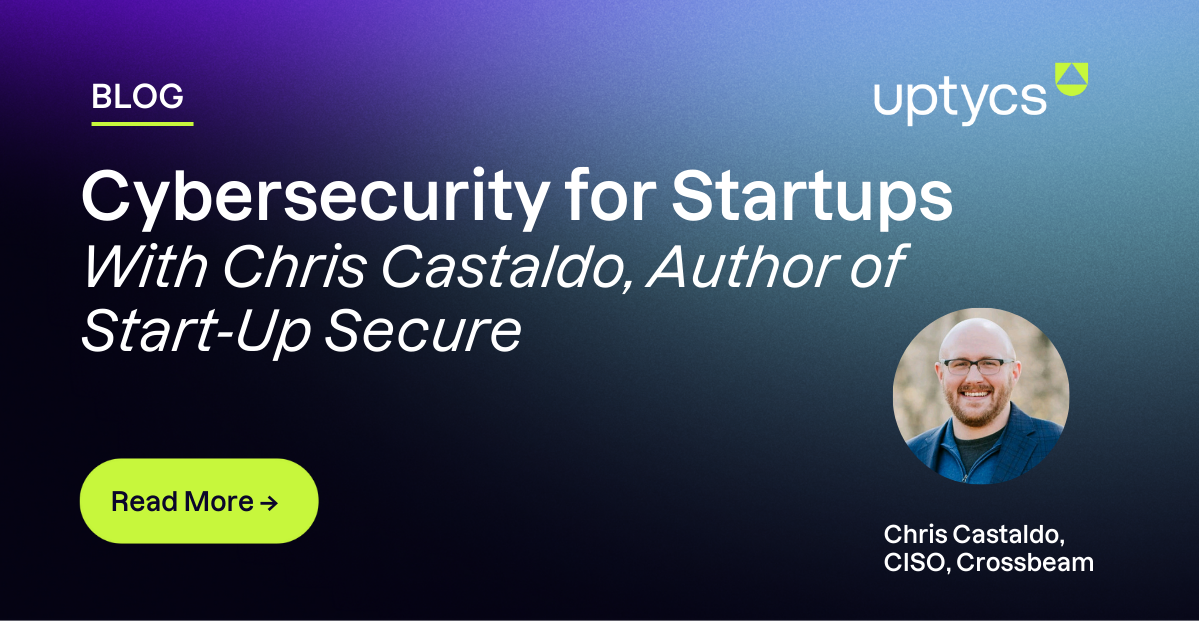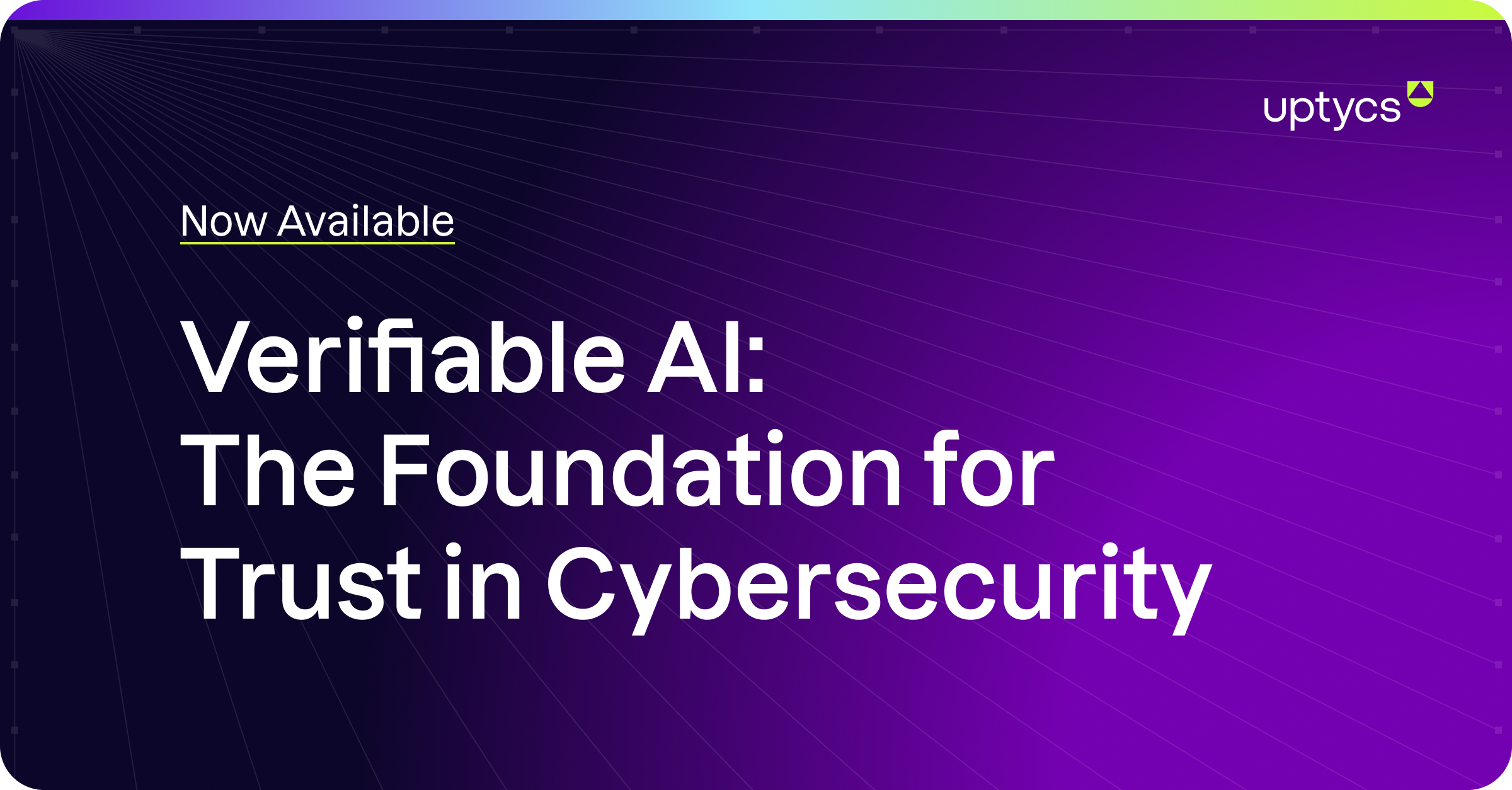Startups are exciting ventures, aren’t they? There is so much going on in these little powerhouses of innovation and productivity. Sadly, cybersecurity is too often not on their radar when making those crucial first business decisions.
I want to thank Chris Castaldo, CISO of Crossbeam, for joining Uptycs in our Cybersecurity Standup this week to share his expertise on the matter. Chris’ book, Start-Up Secure: Baking Cybersecurity into Your Company from Founding to Exit, covers everything a founder, entrepreneur, and venture capitalist should know when building a secure company in today’s world.
Here I have gathered up some key takeaways from Chris’ book, as well as a little old fashioned Googling, to get the conversation started. What do startups really need to consider when developing a cybersecurity strategy?
Why Cybersecurity Is Overlooked by Many Startup Founders
Cybersecurity is a crucial aspect of running a successful business in the digital age. However, many startup founders tend to overlook its importance, leaving their businesses vulnerable to cyber threats.
Many startup founders are not fully aware of the potential risks and consequences associated with such threats. They might not understand the scope of cybersecurity or the importance of protecting their digital assets. Or, they could mistakenly believe that their businesses are not attractive targets for cybercriminals due to their size or niche. However, cybercriminals often target small businesses and startups because they typically have weaker security measures compared to larger organizations.
Startups often focus on rapid growth, aiming to quickly scale their businesses and acquire new customers. They’re operating with limited resources—including time, money, and personnel. This can lead founders to prioritize product development, marketing, and customer acquisition over other aspects of their business such as cybersecurity. Unfortunately, this approach can leave their systems and data exposed to cyber threats.
While it’s understandable that startup founders likely face various challenges and competing priorities, founders need to recognize the importance of cybersecurity and invest in appropriate measures from the outset. By doing so, they can better protect their valuable digital assets, maintain customer trust, and ensure the long-term success of their startups.
Watch "Cybersecurity for Startups" with special guest Chris Castaldo:
First steps for developing a cybersecurity strategy
By focusing on these initial steps, you can establish a strong foundation for your cybersecurity strategy. These can be further refined as your business grows and evolves.
- Risk assessment - Conduct a thorough risk assessment to identify potential vulnerabilities, threats, and risks specific to your business. This will help you prioritize your cybersecurity efforts and allocate resources effectively.
- Develop security policies and procedures - Create a comprehensive set of security policies and procedures that address key cybersecurity aspects, such as data protection, access control, and incident response. These should be documented and communicated to all employees.
- Implement basic security controls - Start with foundational security controls, including strong passwords, multi-factor authentication (MFA), encryption for data storage and transmission, firewalls, and antivirus software. Such basic measures can significantly reduce the likelihood of a security breach.
- Employee training and awareness - Establish a cybersecurity training program for your employees that covers best practices, social engineering threats, and the secure use of company devices and systems. A well-informed workforce is one of the most effective defenses against cyber threats.
- Access control – Implement strict access control measures to limit who can access sensitive data and systems. These include role-based access, MFA, and regular reviews of user permissions.
- Secure your network – Set up firewalls, intrusion detection and prevention systems, and network segmentation to safeguard your digital infrastructure. Secure remote access using VPNs and ensure all network devices are updated and patched regularly.
- Incident response plan – Develop a robust incident response plan, outlining actions to be taken in the event of a security breach. It should include roles and responsibilities and communication protocols, as well as containment, eradication, and recovery procedures.
How to Survive & Thrive in an Evolving Cybersecurity Landscape
Stay informed about the latest trends, threats, and best practices. This will help you make informed decisions about your cybersecurity strategy and adapt to new challenges as they arise. Seek scalable security solutions as your security needs will evolve along with its growth. Use security tooling that leverages automation and analytics to proactively identify and mitigate threats.
Also, don’t underestimate the importance of fostering a security-first culture by encouraging all staff members to prioritize security in their daily tasks. This is achieved through regular training, communication, and reinforcement of security best practices.
Participating in threat-sharing communities helps you stay informed about emerging threats and vulnerabilities, thus enabling you to respond more effectively to new risks. And attending cybersecurity events gives you an opportunity to discover vendors that could meet your needs. You also get a chance to talk with other founders to get their expertise.
When to Outsource Cybersecurity Services
Startups should consider outsourcing cybersecurity services when they realize their in-house capabilities are insufficient to effectively address their security needs—whether due to limited resources, lack of expertise, or rapid growth. Outsourcing can be a cost-effective way to access specialized cybersecurity services and expertise without having to set up or manage an internal security team.
When choosing cybersecurity services, carefully assess the unique requirements, budget constraints, and capacity your company has to work with (e.g., personnel, tooling). It's important to select the right combination of services that effectively address your business's security concerns while remaining cost-effective and scalable as your business grows.
Some Cybersecurity Services for Startups to Consider
Managed Detection and Response (MDR) – MDR services provide 24/7 security monitoring, threat detection, and incident response. They can help startups ensure continuous protection against evolving threats without requiring an in-house security team. The need for MDR could arise from limited resources, strict compliance requirements, or increased complexity. MDR services can effectively manage threat detection and response at an affordable cost compared to hiring a full-time security team.
Security as a Service (SECaaS) – This subscription-based model offers various security services, such as threat intelligence, vulnerability management, and intrusion detection. It enables startups to access advanced security solutions without investing in infrastructure or expertise.
Security Consulting Services – Security consultants can help startups develop a comprehensive cybersecurity strategy, provide guidance on compliance, and assist with implementing security controls, policies, and procedures.
Security Awareness Training – While it might seem more suitable for mature startups, it's a good idea for startups at any stage to invest in security awareness training. Staff members are often the weakest link in your security chain, and training can help reduce the risk of successful phishing attacks and other social engineering tactics that target users.
Vulnerability Assessment and Penetration Testing (VAPT) – Regular VAPT services can be beneficial at any startup stage. Identifying and addressing vulnerabilities early on can prevent costly security breaches and help build a more secure infrastructure as the company grows. Early VAPT assessments can also establish a baseline for future assessments and improvements.
Incident Response Services – Establish a relationship with an incident response service long before it's needed. This ensures they’re familiar with your business and infrastructure, thus enabling them to respond quickly and efficiently when an incident occurs. In addition, starting a relationship with an incident response service signals to your customers, investors, and other stakeholders that your startup takes cybersecurity seriously and is committed to protecting its assets and data.
Conclusion
It’s important for startups to prioritize cybersecurity from the very beginning to protect valuable digital assets and maintain customer trust. By staying informed regarding the latest trends and best practices, implementing a strong cybersecurity strategy, and fostering a security-first culture, founders can effectively navigate the ever-evolving cybersecurity landscape. As your business grows and evolves, being prepared to adapt and invest in the right cybersecurity measures will ensure long-term success and resilience against cyber threats.







